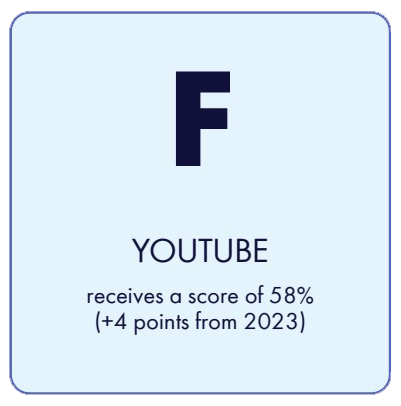YouTube

YouTube earns a score of 58, a score improvement of four points. In a change from last year’s evaluation, YouTube has launched a dedicated feature allowing YouTube creators to add gender pronouns to their channels. YouTube also provides creators with limited options to customize who can see their pronouns, allowing them to choose whether to display their pronouns to everyone or to their subscribers only. However, no disclosure was found that indicates that a similar feature is available for users. The company continues to make a public commitment to taking proactive steps to diversify its workforce, and publishes voluntarily self-disclosed data on the number of its LGBTQ employees.
The company continues to fall short of providing adequate policy protections for its LGBTQ users in several other key areas. Notably, YouTube is the only company evaluated in the SMSI that has no policy in place that protects transgender, nonbinary, and gender non-conforming users from targeted misgendering and deadnaming. While the company prohibits targeted advertising based on users’ disclosed or inferred sexual orientation or gender identity, no similar disclosure was located that prohibits advertisers from excluding users from seeing ads based on their disclosed or inferred sexual orientation or gender identity. The company continues to provide only limited information regarding the steps it takes to address the wrongful demonetization, filtering, and removal of LGBTQ creators and content from ad services.
Key Recommendations:
- Make an express policy commitment to protect transgender, nonbinary, and gender non-conforming users (including public figures) from targeted misgendering and deadnaming: The company should adopt a policy that protects users from targeted misgendering and deadnaming that does not require self-reporting; this policy should also protect public figures, and YouTube should also disclose that it employs various processes and technologies — including human and automated content moderation — to detect content and behaviors violating these policies.
- Prevent advertisers from wrongfully excluding LGBTQ users from seeing ads: The company should disclose that it does not permit advertisers to exclude users from seeing ads based on their disclosed or inferred sexual orientation and/or gender identity.
- Show greater commitment to addressing wrongful demonetization and removal of LGBTQ creators and their content: The company should disclose comprehensive information on the concrete steps it takes to minimize wrongful demonetization and removal of legitimate content related to LGBTQ issues from ad services. YouTube should also publish comprehensive data on the wrongful removal of LGBTQ creators and their content.












